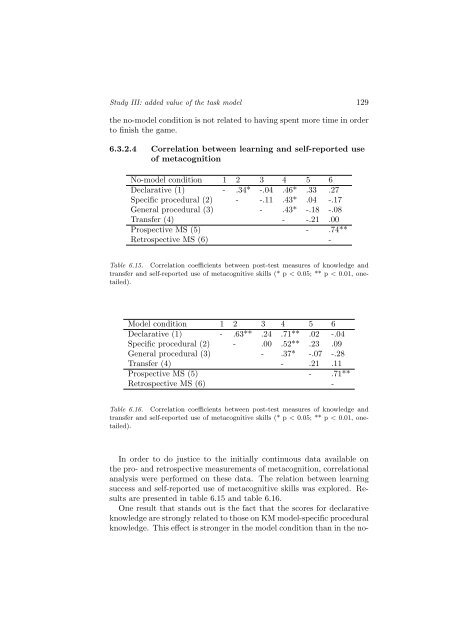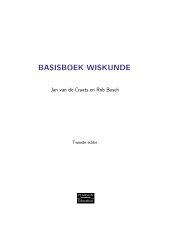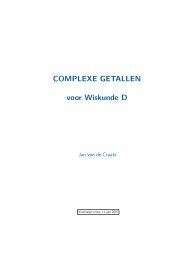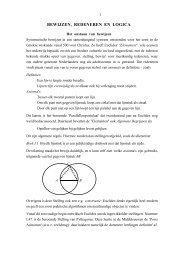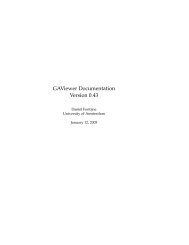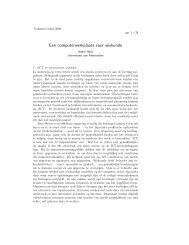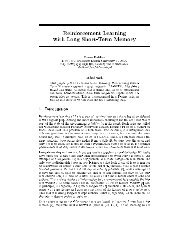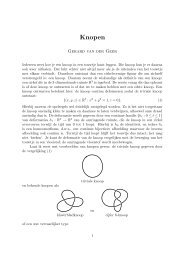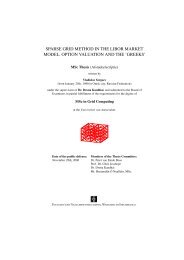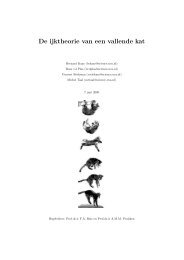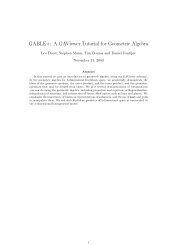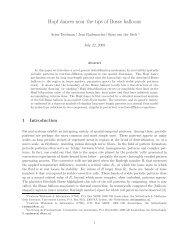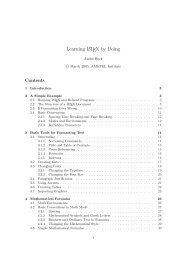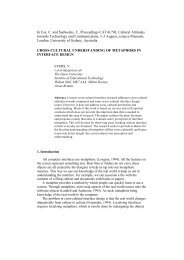The role of metacognitive skills in learning to solve problems
The role of metacognitive skills in learning to solve problems
The role of metacognitive skills in learning to solve problems
You also want an ePaper? Increase the reach of your titles
YUMPU automatically turns print PDFs into web optimized ePapers that Google loves.
Study III: added value <strong>of</strong> the task model 129<br />
the no-model condition is not related <strong>to</strong> hav<strong>in</strong>g spent more time <strong>in</strong> order<br />
<strong>to</strong> f<strong>in</strong>ish the game.<br />
6.3.2.4 Correlation between learn<strong>in</strong>g and self-reported use<br />
<strong>of</strong> metacognition<br />
No-model condition 1 2 3 4 5 6<br />
Declarative (1) - .34* -.04 .46* .33 .27<br />
Specific procedural (2) - -.11 .43* .04 -.17<br />
General procedural (3) - .43* -.18 -.08<br />
Transfer (4) - -.21 .00<br />
Prospective MS (5) - .74**<br />
Retrospective MS (6) -<br />
Table 6.15. Correlation coefficients between post-test measures <strong>of</strong> knowledge and<br />
transfer and self-reported use <strong>of</strong> <strong>metacognitive</strong> <strong>skills</strong> (* p < 0.05; ** p < 0.01, onetailed).<br />
Model condition 1 2 3 4 5 6<br />
Declarative (1) - .63** .24 .71** .02 -.04<br />
Specific procedural (2) - .00 .52** .23 .09<br />
General procedural (3) - .37* -.07 -.28<br />
Transfer (4) - .21 .11<br />
Prospective MS (5) - .71**<br />
Retrospective MS (6) -<br />
Table 6.16. Correlation coefficients between post-test measures <strong>of</strong> knowledge and<br />
transfer and self-reported use <strong>of</strong> <strong>metacognitive</strong> <strong>skills</strong> (* p < 0.05; ** p < 0.01, onetailed).<br />
In order <strong>to</strong> do justice <strong>to</strong> the <strong>in</strong>itially cont<strong>in</strong>uous data available on<br />
the pro- and retrospective measurements <strong>of</strong> metacognition, correlational<br />
analysis were performed on these data. <strong>The</strong> relation between learn<strong>in</strong>g<br />
success and self-reported use <strong>of</strong> <strong>metacognitive</strong> <strong>skills</strong> was explored. Results<br />
are presented <strong>in</strong> table 6.15 and table 6.16.<br />
One result that stands out is the fact that the scores for declarative<br />
knowledge are strongly related <strong>to</strong> those on KM model-specific procedural<br />
knowledge. This effect is stronger <strong>in</strong> the model condition than <strong>in</strong> the no-


